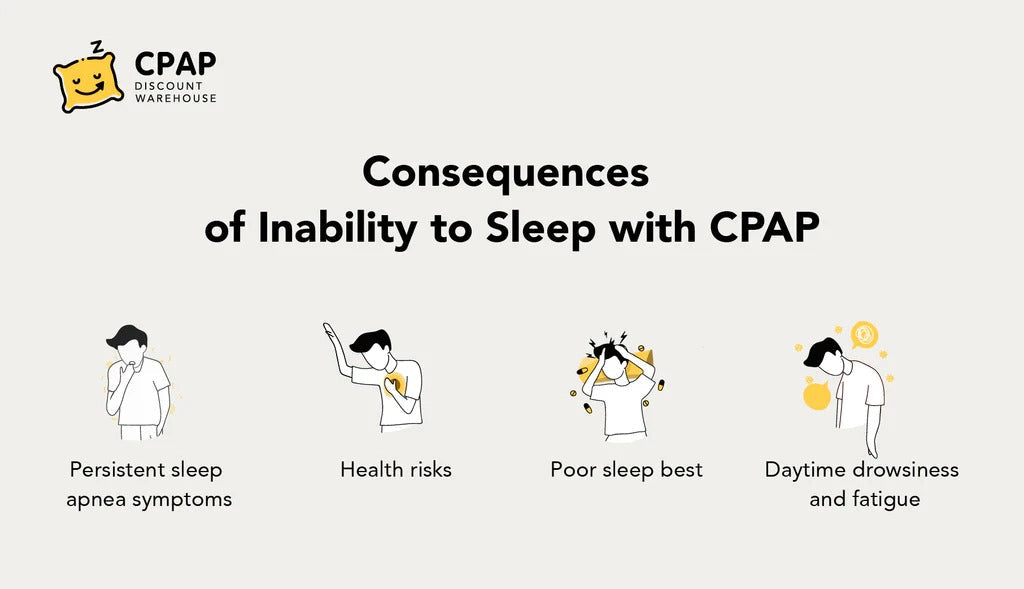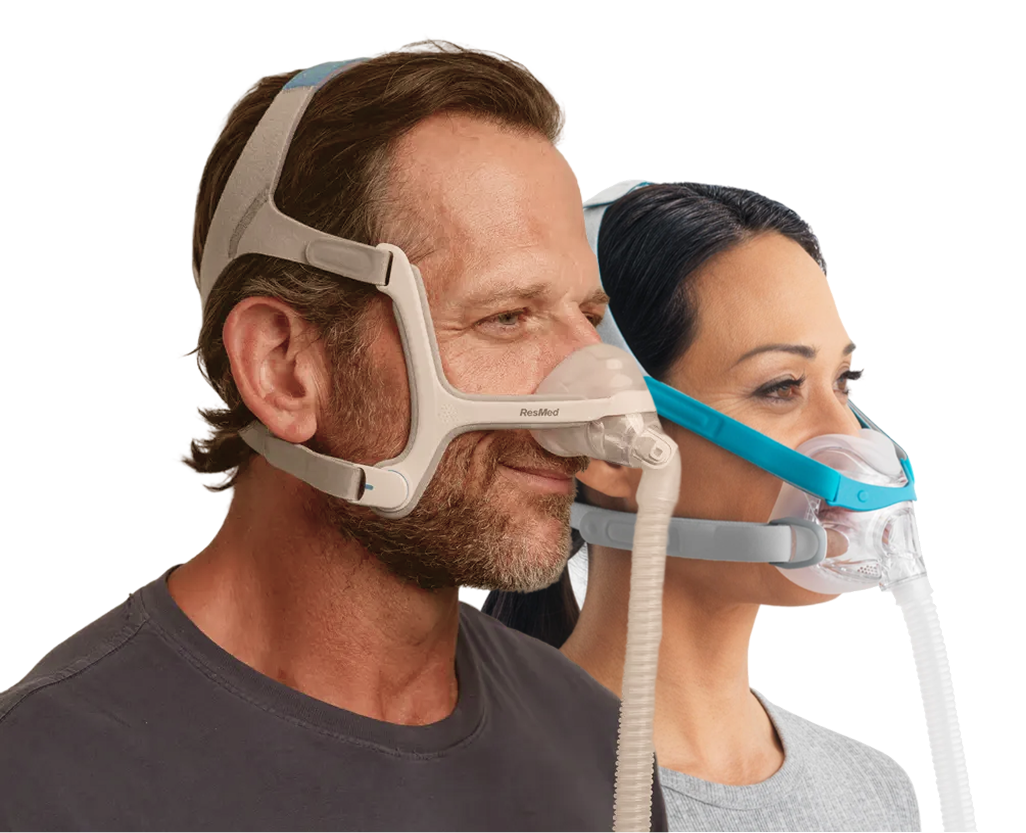Sleep disturbances caused by interrupted breathing are hallmarks of sleep apnea, which affects numerous individuals worldwide. Amongst available treatments is CPAP therapy. It offers respite from such disruptions by providing continuous positive airway pressure during slumber hours. However sleeping with a CPAP machine can be cumbersome for some people leading to unresolved symptoms and other health problems. This article endeavors to evaluate the long-term side effects of cpap machine while offering viable alternatives fоr those impacted by this debilitating condition.
Why use a continuous positive airway pressure CPAP machine?
CPAP is a machine that uses a small amount of air pressure to keep your breathing airways open while you sleep. Your doctor might suggest that you use a CPAP machine to help with breathing problems while you sleep, like sleep apnoea. CPAP can also help preterm babies with underdeveloped lungs.
8 Common CPAP side effects when using CPAP machines
Using a CPAP machine for sleep apnoea can lead to various side effects, including long-term complications. Below are some commonly reported issues:
Dry Nose and Throat
Sometimes, CPAP therapy can make your nose and throat feel dry. This is mostly because dry air goes through the nose. Using a humidifier with the CPAP machine often helps with this. The air pressure from the CPAP machine can cause congestion in the sinuses or nose. If this is not treated quickly, it can cause nose bleeding. The air blown into the mask can feel dry, which can cause a burning feeling in the lungs for some patients.
Many new CPAP machines now have a heated humidifier that adds moisture to the air. This makes the airways and nose less dry, which makes it easier to breathe. If you have a humidifier, make sure it is clean and working properly.
Air Leakage
If your CPAP machine is set to a high air pressure, it can cause air to leak from the mask, making the therapy less effective. If you notice or hear air escaping, try adjusting the mask so it sits snugly on your face and forms a proper seal. Make sure the fit matches the contours of your face. If leakage continues, it could be due to wear and tear on the mask.
Shortness of Breath
The CPAP machine makes sure you breathe enough air while you sleep. But it can make you feel like you can't breathe, especially if you're not used to wearing the mask or the feeling of the air pressure.
Claustrophobia
Many patients feel claustrophobic when they use a CPAP machine. The air pressure should help patients to sleep better, but they often feel uncomfortable because the CPAP mask is strapped to their face and covers their nose and a large part of their face. This is a common problem with CPAP machines. If you use a full face mask, you may experience this problem more often than others.
You could try a mask that just covers your nose and mouth so that you don't feel claustrophobic.
If your sleep specialist advises using a full-face mask, you can ease into it gradually. Start by wearing it for short naps or while you’re awake such as when reading or watching TV, so you can get used to the feel. As you become more comfortable, extend the time you wear it.
If your CPAP machine includes a Sleep Onset Detection feature, it can make the adjustment process easier. This function starts with lower air pressure and automatically increases it to the prescribed level once it detects you’ve fallen asleep
Aerophagia (Swallowing Air)
Many people using a CPAP machine for obstructive sleep apnoea report the sensation of “swallowing” air. This often happens when the air pressure is set too high, causing them to gulp air in an attempt to adjust. Medically, this is called aerophagia, and it can result in excessive belching, stomach bloating, and abdominal discomfort.
To prevent aerophagia, the CPAP pressure setting should be adjusted to a lower, more suitable level. It’s best to consult a sleep specialist, who can recommend the correct settings for effective and comfortable treatment.
Nasal Congestion
Some people experience nasal congestion and a runny nose when they use CPAP. People having this treatment may also experience dry nose from the air flowing into the nose. Dry air can cause nosebleeds and noses to crust over. It is very common for people using CPAP to have dry noses in cold weather or low humidity.
Skin irritation
For a CPAP mask to deliver air effectively, it needs to fit tightly against the face. Wearing it for long hours can cause discomfort or pain, especially if the mask doesn’t match the wearer’s facial size and shape.
Pressure from the mask or its straps may also lead to skin redness, sores, or other irritation in the areas where they make contact.
>>>> How to Clean Your CPAP Machine?
CPAP machine side effects dangers
+ Body changes after CPAP
Persistent sleep apnea symptoms: If you are unable to fall asleep with CPAP, your sleep apnea may go untreated, resulting in persistent symptoms such as loud snoring, gasping during sleep and daytime sleepiness. Untreated sleep apnea can seriously affect your quality of life.
Poor sleep best: difficulty napping with a CPAP can lead to restless nights and fragmented sleep, preventing you from achieving the restorative sleep necessary for best cognitive function, emotional nicely-being, and physical fitness. Explore the relationship between CPAP and good sleep for a deeper understanding of the matter.
Daytime drowsiness and fatigue: Inadequate sleep due to CPAP intolerance can cause Excessive Daytime Sleepiness, affecting your productivity, focus, and mood during the day.
+ Side effects of long term cpap use
CPAP side effects lungs: One of the CPAP machines side effects that people sometimes report is lung pain, chest pain, or a funny feeling in the lungs upon awakening.5 However, this pain does not come from the lungs and does not indicate that the lungs are injured or damaged by the machine. Rather, it is a pain that occurs when the chest muscles adapt to exhale against pressure.
CPAP side effects weight gain: Some of these and other studies reported a significant increase in IGF-1 in PPC-dependent patients. Restoration of the GH axis and increased IGF-1 in PPC-dependent patients therefore probably contributed to weight gain and a potential increase in LBM.
CPAP side effects heart: Although CPAP machines are not known to cause heart problems, a malfunctioning CPAP machine can contribute to these problems by exposing you to carcinogenic particles and toxic chemicals. CPAP machines can reduce the likelihood of heart failure in sleep apnea patients, especially if they are over 60.

How to Prevent CPAP Machine Side Effects
| Adjust or replace your CPAP Mask |
- Proper CPAP masks fitting, regular cleaning - Adjust the straps for a snug but comfortable seal. Try different mask sizes or styles if leaks persist. - Ensure the mask fits snugly but not too tight to avoid pressure on the nasal passages. |
| Try the CPAP Accessories |
- Use a Chin Strap to keep your mouth closed while using CPAP machine for sleeping to prevent air leakage. - Attach a humidifier to your CPAP machine to maintain moisture in your airways and reduce dry mouth. |
| Keep your CPAP devices clean |
- Clean the mask daily with mild soap and replace worn-out parts regularly to prevent bacteria buildup - Regular cleaning of the CPAP components is essential. Consulting a healthcare provider can help address any persistent discomfort. |
| Sleep position and lifestyle changes |
- Sleep on your side - Behavioral techniques, including rest sporting events, will let you manage anxiety or claustrophobia. |
>>>> How to use CPAP machine step by step?
FAQs
What is the life expectancy of a person with sleep apnea?
Studies show that sleep apnoea that isn't treated can reduce your life expectancy by several years. The American Academy of Sleep Medicine says that not treating sleep apnoea can make you 17% more likely to die early or late because of the health problems that come with it.
Can CPAP cause cellulitis?
The CPAP machine can cause ulcers (sores) in the skin across the nose. These ulcers can get infected, which can lead to swelling and infection around the eyes and inside the head.
Does a CPAP machine cause coughing?
If you have been coughing more since you started CPAP therapy, it might be because the air is drying out. Many people find that using a humidifier with their CPAP machine helps to reduce this issue.
If you have sleep apnea, your healthcare provider may recommend a continuous positive airway pressure cpap machine as the first treatment option. While using a machine for sleep may feel inconvenient, quality rest is essential for your health. If your CPAP is uncomfortable, speak with CPAP Discount Warehouse about different mask and machine options. With some adjustments, you can find a solution that ensures restful sleep.






